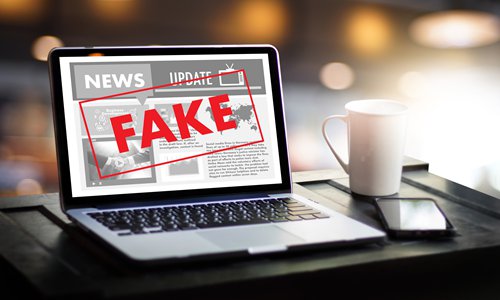HOME >> OPINION
HK needs to fight fake news through legislation
By Mu Lu Source:Global Times Published: 2019/10/8 22:13:40

Photo: IC
Singapore's Protection from Online Falsehoods and Manipulation Act took effect on October 2, aimed at combating the spread of deliberate online falsehoods. The Singaporean government wishes to make, through legislation, protection from forgery and spreading fake news online an obligation of citizens.
The Singaporean government approved such a law because conventional measures to deal with disinformation could not handle the impact of foreign hostile information campaigns (HICs). It needed a law to give government powers "to make targeted, surgical interventions, to investigate and respond expeditiously to HICs," said K. Shanmugam, Singapore's Minister for Home Affairs and for Law.
The protests and the following riots which have lasted more than 100 days in Hong Kong have proven what HICs could cause, and showed what the Hong Kong Special Administrative Region (SAR) government needs to learn from Singapore to combat such disinformation through legislation.
Fake news could incite protests to further the split in societies and fuel antagonism between different groups, which could make people gradually lose trust in the governments of their countries.
Hong Kong is an open society and easily exposed to fake news because of the internet. Online falsehoods pretend to be true, which makes them nearly impossible to be effectively defended against. Many net users have unconsciously become the disseminators of disinformation, especially in the context of some Western media outlets rocking the boat by spreading fake news about Hong Kong problems.
There is no crime ordinance in Hong Kong that specifically deals with online falsehoods. The SAR government can only clarify rumors after being widely spread. Hong Kong's provisions in this field have fallen behind the times. Social network (SNS) platforms such as Facebook, Twitter and Youtube have also become main channels to spread online falsehoods. In the meantime, in addressing HICs online, tech companies cannot be left alone to self-regulate. The platforms' algorithms could push towards extremity.
In the 2016 US presidential election, US President Donald Trump's team prioritized Facebook because "their more inflammatory messages got far more reaction from Facebook users." Through this example, we can see that it is not difficult for malicious people to take advantage of these SNS platforms to spread fake news.
However, as some Western countries try to escalate tensions in Hong Kong, they are also haunted by fake news. While some British are concerned that online political advertising could wreck their country's coming general election, nearly all Americans "are troubled by the state of the media" - 67 percent of them believe "ethics in journalism will be worse during the 2020 presidential campaign."
This has showed the need to combat fake news through legislation in Hong Kong.
To prevent disinformation from misleading more people, and, in particular, to fight foreign smear tactics against the Chinese mainland and Hong Kong, the SAR government should increase its efforts to crack down on hostile information and impose heavy penalties on people who deliberately spread falsehoods. Fake news should not be allowed to affect the society.
Posted in: OBSERVER